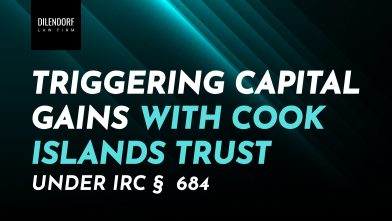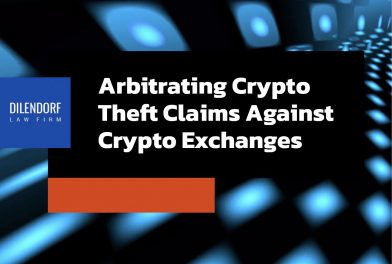Top Legal Considerations When Launching A U.S. Crypto Hedge Fund
This article focuses on crypto hedge funds based in the United States which target U.S. accredited investors only. As such, and for purposes of simplicity, there will be no mention of offshore funds, international tax considerations, or other aspects relevant to hedge funds operating outside of the U.S. or targeting foreign investors.
I. Introduction
Launching a crypto hedge fund can be a daunting task. It is a complex endeavor that requires careful consideration of a range of issues that bring the fund under the purview of regulatory authorities such as the Securities and Exchange Commission (SEC), the Commodities Futures Trade Commission (CFTC), and the US Department of the Treasury’s Financial Crimes Enforcement Network (FinCEN), just to name a few. Moreover, some of the decisions your team will make will relate to more technical issues, such as choosing a fund administrator which can handle the goals and needs of the fund.
Therefore, before embarking on the journey that is setting up a crypto hedge fund, every team should gather and process the requisite information in preparation for lawyers, fund administrators and auditors, and, most importantly, potential investors. Matters to consider range from broad issues–investment strategy, for example–to more minute details, such as the number of transactions the fund will make per any given month.
To further illustrate, every team should discuss internally and determine what its fund’s investment strategy will be. For example, will the fund be investing in decentralized finance (DeFi)? That is, will the fund be involved in staking, lending, and borrowing on DeFi platforms?
If so, will the chosen fund administrator have the capability to process these transactions? Or will the fund invest strictly in cryptocurrencies that are traded on centralized exchanges? Will the fund invest in network tokens?
A combination of the three? The answer to this question is important not only because it impacts the risk associated with investing in the fund but also because it relates to the question of whether the fund is investing in securities or not.
Moreover, the nature of the investment, such as an investment in an illiquid network token that has yet to be distributed, may require the need for “Side Pocket Investments.” Side pocket investments grant the investment manager complete control over the funds in a particular side pocket, which enables the investment manager to invest in projects which are not yet liquid, and which cannot be immediately sold and returned to investors. This limits the investors’ ability to cash out in certain circumstances–including investments in network tokens.
Another critical aspect to consider is which fund administrator best suits the fund’s goals and needs. Choosing an administrator with experience in the crypto space will help ensure a smooth, trustworthy, and cost-effective relationship. Jumping off of that point, who will the team choose as an investment manager? What will their background and experience be? Will potential investors have confidence in the investment manager’s abilities?
Further, who will be responsible for the costs and expenses associated with the fund? (i.e., management fees; general investment expenses; administrative, legal, accounting, auditing, record-keeping, tax form preparation, compliance, and consultation costs; governmental licensing, filing and exemption fees; etc.). One thing to note is that sponsors for hedge funds–that is, the person or entity responsible for financing the costs of setting up the fund–have the option to amortize the costs over a period of three to five years.
These questions are just the tip of the iceberg when it comes to setting up a crypto hedge fund. While teams must address issues related to setting up a traditional hedge fund, they will also have to consider issues related to investing in the crypto field specifically. All this is to say establishing a successful crypto hedge fund demands careful discussion, analysis, and decision-making from the founding team. It requires contemplation of scores of different matters which will have an impact on issues ranging from tax implications to potential liability to regulatory scrutiny.
The Dilendorf Law Firm is well-equipped to help guide clients through the arduous yet rewarding journey that is creating and operating a successful crypto hedge fund. The following is a non-exhaustive list of matters to consider when setting up a crypto hedge fund.
II. Top Legal Considerations and Issues
Typical Hedge Fund Structure:
A hedge fund can generally be described as a partnership between a fund manager and investors. For purposes of hedge funds targeting only US accredited investors or qualified purchasers, the fund will usually be structured under three separate legal entities: (1) a Limited Partnership; (2) a General Partnership; and (3) an Investment Manager.
The Limited Partnership (LP) – The typical hedge fund will be structured as a limited partnership, with an investment manager serving as the general partner through a limited liability company (LLC). In return for capital contributions from investors, investors will receive partnership interests along with a capital account in the partnership. The gains and losses from the fund’s performance are then passed through to the investors’ capital accounts on a pro-rata basis.
The General Partner (GP) – The GP assumes the role of managing the day-to-day operations of the fund and has the authority to make decisions without the knowledge or permission of the other partners. In some cases, the GP may be a limited partnership with its general partner taking the form of an LLC. While this may give the appearance of limited liability, it is important to note that the GP can be held personally liable for many unexpected liabilities, regardless of the legal form of the entity which serves as the GP.
Forming the GP as an LLC or LP is advantageous, however, because it provides opportunities for estate planning, for offering equity interests to employees or strategic investors, or for creating incentive compensation arrangements for employees. Teams should ensure that all the terms between the partners are in place, or risk delaying the process. Issues that generally require consensus among the partners may include investment decisions; voting procedures; deadlock procedures; and contribution of additional capital.
The Investment Manager (IM)– An IM will typically be hired by the GP/fund to serve as a manager to oversee and manage the investments in the hedge fund’s portfolio. Similar to GPs, IMs generally take the form of an LLC. The role of the IM is to determine investment strategy and make investment decisions and allocations, along with managing the fund’s portfolio risk. The IM makes daily investment decisions for the fund, choosing where and when to allocate investment capital.
Type of Fund:
Another consideration to take into account when launching a crypto hedge fund is what type of fund structure to organize under. Hedge funds are typically structured as one of two types of funds–a 3(c)(1) fund or 3(c)(7) fund.
3(c)(1) Fund – Under the 3(c)(1) exemption from registration as an investment company under the Investment Company Act (ICA), 3(c)(1) hedge funds will not have to register under the ICA if its outstanding securities are owned by 100 or less persons. A 3(c)(1) fund allows you to have an exempt offering targeting up to 100 accredited investors–that is, investors with a net worth of $1 million or an annual income of $200,000/year or joint annual income of $300,000/year for spouses. 3(c)(1) is the go-to structure for hedge funds.
3(c)(7) Fund – On the other hand, under the 3(c)(7) exemption from registration under the ICA, 3(c)(7) funds are excluded from registration as an investment company only if the fund limits its limited partners (LPs) to “qualified purchasers” who own no less than $5,000,000 million in investments, and to entities which own no less than $25,000,000 in investments. Importantly, 3(c)(7) funds cannot raise funds from accredited investors–they must be qualified purchasers. And, while there are no limits to the number of investors that can participate in a 3(c)(7) fund, funds that reach 2,000 investors will fall under the regulation stipulated in the Securities Exchange Act of 1934 and will be subject to increased scrutiny from the SEC.
Required Documents:
Private Placement Memorandum (PPM) – The PPM is a securities disclosure document used in a private securities offering by a private issuer or investment fund. A PPM provides investors with the necessary information about the issuer and its securities required to make an informed investment decision. Moreover, a PPM protects the issuer from potential liability by disclosing important information about the risks, strategies, investment criteria, and other material information about the fund and its securities.
Common sections typically found in a PPM include a directory; a summary of key terms; management of the partnership; risk factors; side pocket investments; management fees and expenses; allocation of profits and losses; performance allocation; valuation; potential conflicts of interest; brokerage and custody; federal income tax considerations; qualification of investors; restrictions on transfers of interests in the partnership; and privacy notice.
Importantly, however, a PPM does not constitute an offering. A PPM is merely a disclosure document that describes the offering, including the fund’s structure, strategies, risks, and management, among other information. A PPM will be prepared and offered together with the issuer’s organizational documents, such as an operating agreement, a limited partnership agreement, and subscription documents, to name a few.
LLC Agreements for Investment Manager and General Partner – LLC Agreements act as Operating Agreements between the principals. They typically outline the equity interest of the principals and the managerial authority in the fund, among other issues.
Limited Partnership Agreement (LPA) – The LPA is the governing document for the fund. It outlines the terms of the fund and the rights of the investors and fund manager. An LPA is a complex legal document that covers numerous terms related to the operation and governance of the limited partnership. These provisions include, among many others: a definitions section; general provisions describing the formation of the partnership, the partnership’s business, and objective, and the rights, powers, and authority of the general partner; a description of all fees and expenses associated with the fund; an explanation of the allocations and distributions of the profits and losses to all partners; and provisions related to limitations of liability and indemnification.
Subscription Documents – Subscription Documents are documents required for prospective investors to sign to obtain an Interest in the Limited Partnership. These documents generally include: a suitability questionnaire, which confirms the investor is eligible to invest in the fund; a subscription agreement; a signed Limited Partnership Agreement; an Anti-Money Laundering supplement; completed Remitting Bank instructions; and completed and executed Form W-9s.
Investment Manager Agreement (IMA) – An IMA is a formal agreement between a financial adviser and an investor stipulating the terms under which the adviser is authorized to act on behalf of the investor to manage the assets listed in the agreement.
General Partner Compensation:
Federal Law – Under federal law, there is no requirement to register with the SEC unless the fund has Assets Under Management (AUM) of at least $110,000,000 or AUM of at least $25,000,000 and the fund is not subject to registration and examination in the state in which it maintains its principal place of business and its principal office.
A firm that falls within the definition of an “investment adviser,” and which is not eligible for one of the exclusions, must register under the Advisers Act, unless it (i) is prohibited from registering under the Act because it is a smaller firm regulated by one or more of the states or (ii) qualifies for an exception from the Act’s registration requirement. All advisers, whether they are registered or not, must comply with the Act’s anti-fraud provisions.
Up until 1996, most investment advisers were subject to regulation by both the SEC and one or more of state regulatory agencies. The Act was amended in 1996 and again in 2010 to allocate regulatory responsibility between the SEC and the states. Today, most small advisers and “mid-sized advisers” are subject to state regulation of advisers and are prohibited from registering with the SEC. Unless an exemption is available, most large advisers must register with the SEC, and state adviser laws are preempted for these advisers.
New York State Law – GP compensation varies from state to state. Focusing on the state of New York in particular, New York does not require investment adviser registration if the adviser has five or fewer New York-based clients (either funds or individuals). If the investment adviser constitutes a “mid-size adviser”–that is, the adviser controls between $25,000,000 and $100,000,000 AUM–the investment manager is prohibited from registering with the SEC if such adviser is required to be registered as an investment adviser with their home state and is “subject to examination” in its home state.
On the other hand, a mid-sized adviser that relies on an exemption from registration with its home state would not be required to register with its home state and would therefore be required to register with the SEC. The SEC has determined that advisers will not be “subject to examination” in the state of New York. Accordingly, mid-sized advisers with their principal place of business in New York will be required to register with the SEC or find an exemption from registration.
The most relevant exemption in this context is the Private Funds Exemption. The Private Funds Exemption is available to investment advisers that (i) act solely as an adviser to “qualifying private funds” and (ii) have AUM in the US of less than $150,000,000. Investment advisers relying on the Private Funds Exemption are not required to register with the SEC but remain subject to modified reporting obligations of the Exempt Reporting Adviser (ERA). As such, we often recommend investment advisers based in New York state to register as an ERA.
It is important to note that this analysis strictly applies to New York-based funds. Other states, such as California or Texas, have different rules that apply and would require the GP and investment manager to raise funds only from qualified investors.
How does this apply to GP compensation? Section 205(a)(1) of the Advisers Act, which prohibits a registered investment adviser from receiving any compensation “on the basis of a share of capital gains upon or capital appreciation of the funds or any portion of the funds of the client” only applies to “registered or required to be registered with the SEC” investment advisers. An ERA is exempt from registration and thus is not a registered investment adviser.
Under Rule 205-3(b) of the Advisers Act, an adviser that manages a private investment fund relying on the exemption from registration under the Investment Company Act in Section 3(c)(1) must “look through” the fund to determine whether all investors in the fund who are charged a performance fee fall within the definition of a qualified client. Again, this rule only applies to registered or required to be registered investment advisers.
So, it appears that ERAs in New York can charge performance-based fees to accredited investors who are not qualified clients. ERAs in CA and other states (TX, MA, VA, MI etc.) under the private fund manager exemption are still generally subject to the Qualified Client standard, however.
Eligible Investors:
Investor eligibility depends on a number of factors, some of which have already been mentioned. As an initial matter, the eligibility of investors will largely depend on the type of fund you choose to set up. For example, a 3(c)(1) fund allows you to raise funds from up to 100 accredited investors. A 3(c)(7) fund, on the other hand, allows you to raise funds only from qualified purchasers (i.e., individuals who own $5,000,000 or more in investments or institutions who own $25,000,000 or more in investments). Another factor related to investor eligibility is which state the fund and investment manager are registered in.
Marketing the Fund:
The SEC’s Regulation D Rule 506(c) exemption from registration allows fund managers to broadly solicit and generally advertise an offering of interest in the partnership. Moreover, funds can use third parties to sell interests in the funds. And, in most cases, anyone who sells your units–whether they are a “finder” or a “broker-dealer”– must be registered as a broker-dealer because funds must disclose whether or not they used outside help to raise funds when filing Form D exemption from registration.
Investment Strategy:
The fund’s investment strategy is without a doubt one of the most important decisions a team looking to launch a crypto hedge fund will make. However, to limit potential liability and offer more flexibility, it is recommended that you and your team leave the investment strategy as open as possible. Moreover, due to the uncertainties associated with crypto and its legal status, the fund’s investment strategy will have major implications. For example, a fund aiming to invest in DeFi should take care and undergo proper due diligence to ensure that the fund is not investing in securities.
Further, the types of crypto the fund chooses to invest in have implications on whether or not the fund is investing in securities or commodities, and whether the fund will have to register as a Money Service Business or Money Transmitter.
Choosing an Administrator:
Deciding on a fund administrator is yet another critical component to consider when setting up a crypto hedge fund. Fund administrators provide a myriad of services ranging from fund accounting to compliance & regulatory support to financial statement preparation, among others. Fund administrators are responsible for managing the capital accounts of each investor involved in the fund. Additionally, fund administrators are responsible for providing monthly, quarterly, and annual reports which keep track of the fund’s positions. These services include portfolio accounting and reporting, recording of all transactions in the accounting records, subscription and redemption accounting services, performance fee and soft dollar accounting, invoicing, and bookkeeping.
For crypto hedge funds especially, which make thousands of transactions across dozens of different exchanges and platforms, GPs must contract with fund administrators because they provide invaluable services which are almost impossible to be done in-house.
The fund administrator will typically require access to documents such as Limited Partnership Agreements, Private Placement Memoranda, Subscription Documents, Operating Agreements, and identification documents. Moreover, information relevant to the fund administrator includes the current number of investors, the minimum subscription amount, the number of cryptocurrencies traded, and monthly trade volume.
Fees associated with fund administration will generally be based on a percentage of the net value of assets under management. Some fund administrators charge a flat monthly rate while others charge a fee based on a certain basis point. As previously mentioned, one question to consider when choosing a fund administrator includes whether or not the administrator has experience in crypto and/or processing of decentralized finance (DeFi) transactions.
Auditor:
A hedge fund auditor provides financial auditing services for the hedge fund. The auditor will work with the fund manager to review the fund’s valuation methodology as well as the implementation of that methodology. Additionally, the auditor will review the fund’s account statements, including profits and losses. The fund auditor will typically work together with the fund administrator, who is responsible for preparing the fund’s financial statements.
Registering as Exempt Investment Advisors:
Funds are either registered with state(s) or the SEC. For some eligible Private Funds, a firm can register as an Exempt Reporting Adviser (ERA). To register with the SEC a firm must meet have over 100 million in AUM. Moreover, each jurisdiction has regulatory laws that are specific to each state or the SEC.
An ERA is a declaration of exemption by a firm. Nevertheless, ERAs must still meet the applicable reporting requirements
Fully registered investment managers generally must file a Form ADV with the SEC. Where an investment manager is exempt from registration, there remains an obligation to file part 1 of Form ADV, which is filed for exempt investment managers. Auditors typically charge around $4,000 to file part 1 of Form ADV.
Additionally, both ERAs and RIAs are subject to ongoing oversight and supervision. Once the firm is established, there will be applicable elements related to maintaining a compliance program, as well as the firm’s books and records. Compliance service providers provide ongoing compliance services which are designed to ensure that the fund is compliant with the relevant investment adviser regulations.
Standard Terms of Offering Documents:
The following is a non-exhaustive list of terms typically found in hedge fund offering documents:
- Investment Strategy – What will the fund’s investment strategy be? Will the fund have the option to invest in, for example, side pocket investments for illiquid token projects? Will the fund invest in any DeFi projects? What will be the fund’s short and long-term liquidation positions?
- Governance Decisions – Will the partnership require a majority, super-majority, or unanimous vote for governance decisions to pass?
- Other Business Activities – Will the partners be allowed to engage, actively or passively, in other business interests?
- Investment Decision Making – Who will have control of the investment and allocation strategy? Will they have full control of the decisions making?
- Expenses – Examples of expenses that can be deducted as capital expenditures or amortized include costs related to fund formation, legal fees, and fund administrator fees.
- Storage: Every fund must determine who from the team will control the keys for storage of the fund’s assets.
- Side Letters – The use of “side letters” by investors in hedge funds has become an increasingly common business practice. A side letter is essentially a document or agreement executed by the investor with the hedge fund which grants the investor contractually binding assurances from either the hedge fund or its investment manager that modifies the rights and entitlements of that investor. These side letters may offer terms that are more favorable to that particular investor or perhaps even terms in addition to those offered to other investors in the same fund. Examples of common provisions in side letters are provisions that reduce investment management or performance fees; preferred liquidity and redemption terms; “key man” provisions, which enable the side letter investor to quickly redeem their investment in the event a “key man” ceases to be actively involved in the management of the particular fund; and clauses that require more transparency, such as more detailed information regarding the composition of the fund’s portfolio or the fund’s investment strategy.
Time to Launch:
Assuming all the requisite information has been agreed upon by the partners and is in place, a crypto hedge fund can typically launch within two to three weeks’ time.
III. Conclusion
Launching a crypto hedge fund is no easy task. Teams must discuss and decide on a multitude of different issues based on the fund’s goals and needs, some of which may not be as clear as expected. With the proper preparation and due diligence, however, teams can quickly launch a successful crypto hedge fund. The Dilendorf Law Firm can assist clients throughout this process, including helping to identify the relevant issues associated with setting up the fund, advising as to which decisions are best suited for the particular fund, creating the relevant legal entities, and connecting teams with fund administrators and auditors.
Resources
- Introduction to Private Equity Funds
- Private Equity Funds – Formation and Operation
- Closed-End Fund Formation
- Private Equity Demystified – Explanatory Guide
- How to Start a Hedge Fund
- SEC’s Analysis of the Market for Unregistered Securities Offerings
- Tax Treatment of Partnership Funds and Mergers of Investment Companies
- Hedge Fund Basics – IRS Guide
- Opportunities in Private Equity
- Private Equity in the Developing World: Determinants of Transaction Structures
- Hedge Fund Fully Managed by Artificial Intelligence
- Sample Limited Partnership Agreement of the Fund
- Sample Real Estate Fund Formation Agreement
- Private Equity, Venture Capital and Hedge Funds
- Hedge Fund Basics – IRS
- Supporting Innovation Through SEC’s Mission to Facilitate Capital Formation
- Information and Observation on State Venture Capital Programs
- Funds of Funds Arrangments
- Framework for Investor Analysis of Hedge Fund Governance
- Implications of the Growth of Hedge Funds – SEC.gov










